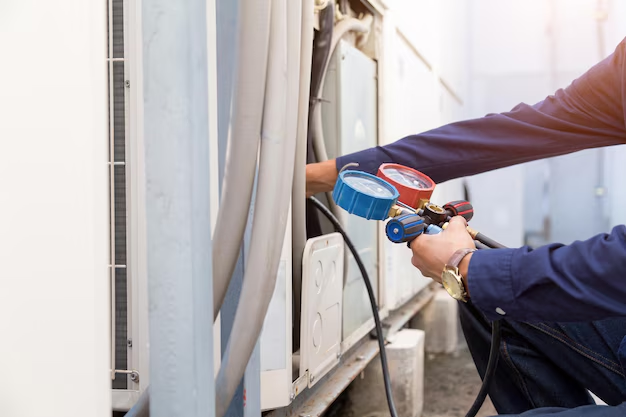How to Safely Remove Freon from Your Refrigerator: A Comprehensive Guide
If your refrigerator is nearing the end of its life cycle, or you're considering an upgrade, you might have encountered the term Freon and the need for its safe removal. Proper handling is crucial due to health and environmental concerns. But who is qualified to manage this task, and how does it fit into the installation & setup process of a new appliance? This guide aims to clarify the nuances around refrigerator Freon removal, ensuring you're informed and confident in your next steps.
🌟 What is Freon and Why is it Important?
Freon is a trade name for a class of chemicals used as refrigerants in appliances like refrigerators and air conditioners. It plays a vital role in the cooling system by absorbing heat inside the refrigerator and releasing it outside.
Why Care About Freon?
- Environmental Impact: Freon and similar substances contribute to ozone depletion and climate change when improperly released into the atmosphere.
- Health Hazards: Direct exposure to Freon can pose health risks, including respiratory issues and skin irritation.
Understanding the importance of Freon management not only helps in preserving the environment but also ensures safety at home.
Qualified Professionals for Freon Removal
Only certified technicians should handle the removal of Freon from your refrigerator. Here’s why:
🌟 Certification and Training
- EPA Certification: Technicians must have Environmental Protection Agency (EPA) certification to legally handle Freons and other refrigerants. This ensures they are trained in safety protocols and environmental guidelines.
- Knowledgeable in HVAC Systems: An understanding of the intricate details of heating, ventilation, and air conditioning (HVAC) systems ensures precise and safe removal.
How to Find the Right Professional
- HVAC Companies: Look for local HVAC service providers as they typically employ certified technicians for such tasks.
- Appliance Repair Services: Some appliance repair companies specialize in refrigeration systems and can offer Freon removal services.
- Online Directories: Use reputable online directories to find certified and reviewed professionals in your area.
The Removal Process: What to Expect
Understanding the process can help alleviate any concerns and foster clear communication with your technician.
Initial Assessment
- Inspection: The technician will first inspect your refrigerator to assess the amount and type of Freon present.
- Preparation: Proper precautions like safety gear and setting up a well-ventilated workspace are essential.
Removal and Disposal
- Refrigerant Recovery: Specialized equipment is used to collect Freon without releasing it into the atmosphere. This step ensures compliance with environmental regulations.
- Safe Disposal: The technician will manage the disposal through certified hazardous waste facilities or recycling centers.
System Sealing
Post-removal, the system is sealed to prevent any leaks, ensuring all Freon is properly contained.
When Should Freon Be Removed?
Freon removal is not a frequent necessity but is required under specific circumstances.
🌟 Situations Necessitating Freon Removal
- Disposal of Old Appliances: If a refrigerator is being discarded, Freon must be removed prior to recycling or trashing.
- Major Repairs: Some significant repairs may require the removal of Freon, particularly when internal components are involved.
- Upgrading or Replacing Units: Transitioning to newer, Energy Star-certified models often involves Freon removal from the older unit before replacement.
Environmental and Legal Considerations
Environmental Concerns
Improper handling of Freon can lead to severe environmental issues. Certified technicians follow strict guidelines to mitigate its impact.
Legal Implications
There are legal requirements set by federal and local governments for refrigerant handling:
- Regulations: Compliance with environmental standards is non-negotiable, with hefty penalties for improper handling or disposal.
- Licensing: Proper licensing ensures technicians follow stipulated safety and environmental standards.
DIY: Why It’s Not Recommended
Despite a growing trend of DIY projects, Freon removal is not advised for non-professionals. Here’s why:
Health and Safety Risks
- Toxic Exposure: Direct exposure during the removal process can pose significant health risks, including frostbite, dizziness, and respiratory distress.
- Improper Equipment: Professional-grade tools are necessary to safely manage refrigerant recovery.
Legal Repercussions
Attempting Freon removal without certification is against the law in many areas, which could result in fines or other penalties.
Transitioning to a New Refrigerator
Once Freon is responsibly managed, transitioning to a new refrigerator becomes your next focus. Here’s a quick checklist for this process:
New Appliance Setup 🌟
- Choosing Eco-friendly Models: Consider units with newer, more environmentally friendly refrigerants, such as R-600a or R-32.
- Professional Installation: Having a certified technician install your new refrigerator ensures it’s set up correctly and efficiently.
- Proper Placement: Positioning your refrigerator away from heat sources and ensuring adequate ventilation can enhance efficiency.
Summary: Key Takeaways for Safe Freon Management
Below is a quick summary to keep in mind about Freon removal and handling:
- 📚 Always use certified professionals: Ensure your technician has the appropriate EPA certification.
- 🔍 Assess the need: Freon removal is necessary for appliance disposal, major repairs, or upgrades.
- 🌍 Consider the environment: Certified technicians adhere to environmental regulations, ensuring minimal impact.
- 🚫 Avoid DIY risks: Safety and legal concerns make DIY Freon removal inadvisable.
- 📈 Upgrade wisely: Choose eco-friendly models and professional installation for optimal performance.
Understanding who can remove Freon from a refrigerator and how the process fits into the broader context of appliance management emphasizes not only safety but also environmental responsiveness. With this knowledge, you are well-equipped to make informed decisions and ensure your home appliance transitions are seamless and responsible.

